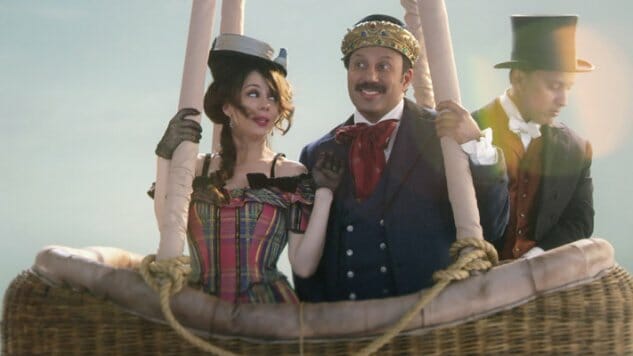Another Period Shows How Antiquated The Bachelor Really Is

It was only a matter of time before the part-reality television spoof that is Another Period cast its critical gaze on The Bachelor. The show regularly makes fun of how society treated women at the turn of the 20th century. What better way to hyperbolize that commentary than by using a form known for its misogynist treatment and sexist portrayal of women in the 21st? After all, any woman worth her Master’s degree and savings account only wants one thing: Marriage.
If you detect a note of bitterness here, it’s less that than boredom. I avoided The Bachelor and all its spin-offs for years before succumbing to the show in 2013. I’d just moved to New York and wanted to bond with my new roommate, who adored it and never missed a Monday. I began joining her every week, she watching hungrily, I ironically (or so I told myself). But eventually I did begin to like it, even beyond the minor schadenfreude it provokes. It can be entertaining. For a while, that is, and then the formulaic nature of the show and especially its casting becomes boring. I watched three seasons, yawned and found something else to do with my time on Mondays. The damage was done, though. I knew enough to pick up on Another Period’s very clear, almost frying-pan-over-the-head parody because The Bachelor involves such heavy-handed repetition when it comes to tropes and sayings, like “Here for the right reasons” and all that jazz.
In “The Prince and the Pauper,” Commodore (David Koechner) finds a foreign bachelor for his daughters Lillian (Natasha Leggero) and Beatrice (Riki Lindhome), since American men find them too old and therefore no longer valuable commodities. It’s a problem going around, apparently. On a date with an eligible Vanderbilt, Lillian learns his wife died tragically after turning 38. “One day she was 37 and then the next thing we knew…” he says, trailing off. Even though both sisters were sure they’d do well on the romantic market, they begin to realize being single over, say, 20 puts them at a disadvantage. “Who knew being single in 1903 with eight children wouldn’t be appealing to all men?” Lillian bemoans.
-

-

-

-

-

-

-

-

-

-

-

-

-

-

-

-

-

-

-

-

-

-

-

-

-

-

-

-

-

-

-

-

-

-

-

-

-

-

-

-








































